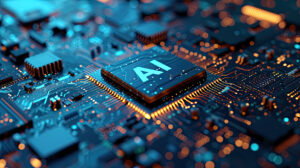
The pace of AI advancement is exceptionally fast—arguably faster than any prior technological revolution. GTP has gone from text generating in 2018 to real time agents preforming task such as research, coding and customer support today. Chat GTP has reached over 100 million users in two months faster than any other tech products in history. There is no doubt that AI is quickly becoming a integral part of daily business.
Companies like Managed Services Partners, LLC, serving the greater Indianapolis area, are beginning to help their clients navigate this complex and necessary technology. Below are a few of impacts AI is having on IT support and systems.

AI’s Impact on IT: What You Need to Know!
1. Workforce Transformation
Job displacement and creation: Repetitive or routine jobs (e.g., data entry, QA testing) are being automated, while new roles in AI model training, prompt engineering, AI ethics, and MLOps are emerging.
New skill development demands: Tech workers must acquire AI-related skills (e.g., machine learning, data science, model fine-tuning) to stay competitive.
2. Product Evolution and Differentiation
AI as a feature: Almost all software is integrating AI (e.g., AI copilots, chat assistants, smart analytics), changing the baseline of user expectations.
New product categories: Entirely new sectors are forming, including generative design tools, AI-based medical diagnostics, and autonomous agents.
3. Business Models and Market Dynamics
Platform dominance: Companies like OpenAI, Google, Meta, and Amazon are shaping the infrastructure layer (foundation models, APIs), creating platform dependencies.
Open-source disruption: Open-source models (like Mistral, LLaMA) are accelerating innovation and democratizing AI, putting pressure on proprietary models.
Subscription-based AI services: SaaS models increasingly include AI-powered tiers, leading to new pricing strategies and customer retention dynamics.
4. Infrastructure Demands
Exploding compute needs: Demand for GPUs and data center capacity is surging, driving growth in cloud providers and specialized chip makers (e.g., NVIDIA).
Energy and sustainability challenges: Large models consume enormous energy, pushing companies to invest in green AI and more efficient algorithms.
5. Regulatory and Ethical Pressure
Data privacy and model transparency: Governments are introducing AI regulations (e.g., EU AI Act), requiring model audits, data protection, and explainability.
Bias and fairness: Ethical scrutiny is high. Companies must demonstrate their models don’t perpetuate discrimination or misinformation.
6. Competitive Pressure and Consolidation
Startups vs. incumbents: AI lowers barriers to entry in some areas (like content creation), while favoring incumbents in others (like large-scale compute).
M&A activity: Big tech firms are acquiring AI startups rapidly, both to gain talent and suppress competition.

The AI revolution is here and MSP can help.—request your free AI assessment today and take the first step toward peace of mind.